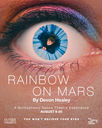TREVOR ANDERSON SCREENS AT THE OUTDOOR PICTURE SHOW
- Jul 27, 2022
- 4 min read

Trevor Anderson is a writer-director-actor and former video store clerk whose short films have been presented at many international festivals. His work has screened three times at Sundance and twice at the Berlinale, where his musical The Man That Got Away (2012) won the D.A.A.D. Short Film Prize. Trevor’s first feature film, Before I Change My Mind, will have its world premiere at the 2022 Locarno Film Festival.
Interview by Rebeccah Love
Can you tell me a little bit about your childhood? What kinds of creative activities were your favourite, growing up?
I grew up queer in Red Deer in the '80s and was lucky to have a mom who indulged my every extra-curricular impulse. Piano lessons! Jazz! Tap! Ballet! Community theatre! Marching band! Choir! Anything to take my mind off growing up queer in Red Deer in the '80s.
What kinds of stories did you enjoy as a kid?
I watched a lot of American sitcoms.Welcome Back, Kotter. WKRP in Cincinnati. Soap.
How would you describe your high school experience? What kinds of art did you take in as a teenager? What was your favourite subject in school?
I was lucky in high school that our drama teacher didn't know what he was doing, but he knew that he didn't know what he was doing, so he let a bunch of us keeners take over. The lunatics really ran that asylum. I positioned myself as a kind of playwright-in-residence and wrote and directed a bunch of one act plays.
What route did you take after high school? What big questions were you exploring in your early adulthood?
I went to Red Deer College and took an acting diploma, then transferred to the University of Alberta in Edmonton and completed a B.A. in Drama. I studied with the drama kids and drank with the visual arts kids.
How did you spend your twenties? What kind of art did you make and gravitate towards?
After university, I started working in the professional theatre scene in Edmonton as a writer and director. I directed a lot of long-format, improvised theatre – this was probably where I learned the biggest lessons about art-making and audiences, lessons that I still carry with me.
Can you tell us a little bit about The Man that Got Away? What big themes were you exploring in this work?
Like I say at the beginning of that film, "My family almost forgot to tell me about my great-uncle Jimmy." I had to dig for the story, and found this black sheep of the family with whom I really identify. He got away from the farm, danced on Broadway, met Judy Garland in rehab, it's quite the adventure. I was able to use these discoveries to explore personal themes of ambition, addiction, and loneliness, in six original songs.
What about Jesse Jams? What big ideas are you digging into with this piece?
Jesse is an Edmonton musician who, because of his multiple mental health challenges, really has to take life one day at a time. It's such an important lesson, simple but not easy. I love how he and his band turn his various daily challenges into fun art, and how this consoles not only Jesse but his audience. It's really my whole art-making manifesto in a nutshell.
Why are short films important? What have you learned about short filmmaking since you started working on these projects?
I first got a taste for short films at the Vancouver Queer Film Festival in the summer of 1991. The shorts I saw there seemed at once very liberated and also achievable. The best thing about short films is that they really have very little connection to the marketplace. You're never gonna make money off a short film, so you might as well make it as bold and far out as you want to. It's a great way to develop one's own voice.
What non-film art forms do you turn to for inspiration?
Ever since my university days when I hung around with the student painters, I've admired their process. I understood David Lynch a lot better once I found out he was a painter first. Gus Van Sant, too. I played in touring punk bands for years, so I'll often turn to music for inspiration.
Can you tell us about the community in which you currently live? Is it an artist-friendly community?
My community is really spread out. I feel like my community is the handful of artists I've stayed in touch with over the years, whether they're people I went to school with, have worked with, or met at film festivals. They're all in different cities.
Are there any artists in your community that our readers should look into? What are their names, and what do they make?
Watch Matthew Rankin's movie The Twentieth Century. It's a gonzo fever dream of corrupt Canadiana, and I make an appearance as a fascist judge.
What are you looking forward to?
After seven and a half years of struggling to get my first feature film made, I'm looking forward to the world premiere of Before I Change My Mind at the Locarno Film Festival in Switzerland this August.






Comments